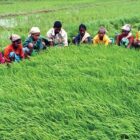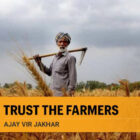Farmer interests are ill served by the fake erudition of questionable academics and farmer representatives, who do not farm. Suicides are a natural corollary of the policy mess
Lowering the monetary poverty threshold to prove that poverty had been reduced was not enough. They proceeded to change how the gross domestic product (GDP) was calculated. All this to prove ‘growth’. They did not even spare the farmer suicides data. Even after such accounting jugglery, when policy makers failed to justify the mess created by years of folly, they changed the measurement scale. Even changing the scale did not help, so they trashed the data as garbage. They may even alter the definition of a farmer to justify the abolition of subsidies. Can they change the realities on the ground?
Scientists try and prove hypotheses. Economists and academics follow the path of research too. Or so one thought. Today they find it expedient to change the arrangement of data to uphold or decry an idea. The way data is classified and presented influences policy. Biraj Swain explains how by reducing the baseline for defining poverty by just 26 cents from $1.51 to $1.25, the number of poor people decreased from 1.75 billion to 733 million. That is how poverty is reduced.
Trying to prove a hypothesis through data, one will generally find ways to substantiate whatever one is trying to prove. Regrettably, no national skill development programme will empower farmers to acquire number crunching skills to counter such absurd viewpoints. It is fair to say that poverty is a precursor to farmer suicides in a majority of cases. The poverty is usually dependent on the state of the rainfall.
If a dot were to be placed for every poor farmer and farmer suicide on a map of India, it would mostly fall over areas where farming is dependent on the rains. There is not enough water for farming but there is a barrage of reasons, some ridiculous, others obnoxious, being cited as causes for farmer suicides. They range from impotency, barrenness, love affairs, to name a few. What is not deniable is that farmer suicides are on the rise.
Only once every few years do commodity prices spike in the international market. When prices of commodities like wheat, rice and onions spike, the government imposes an arbitrary ban on exports. When prices fall in the years following a ban, as it has for potatoes, the government and academics do a Houdini-style disappearing act, leaving farmers in peril. Arbitrary and reactive decisions are the bane of farm policy and such export restrictions are a form of regressive taxation on the farmers and detrimental to their interests.
When prices do rise, the farmers have an opportunity to make a profit and use the proceeds to repay their past obligations. When farmers are denied the opportunity to realise better prices because of export restrictions, they remain burdened with old debt, with moneylenders compounding interest. In the ensuing years, when production is hit by calamitous weather or when prices tank (last year production and prices tanked simultaneously) the farmer’s financial burden shoots up, aggravating the existing crisis and leads to spurt in farmer suicides. Suicides, however, are just statistics to academics. The absence of good policy commits farmers to lives of abject poverty and even suicides. Compensation packages are not the answer.
Ensuring cheap food in times of food scarcity is perfectly justified. Government intervention when farm prices are low is just as desirable. Curiously, economists engage in writing endless documents to establish that farmers are a pampered lot and deserve to have subsidies and support terminated. The thinking behind restricting exports of non-food items like guar or cotton, however, beats reason.
For over two decades the debate on farmer issues has been hanging fire and it was considered necessary to revive a discussion on farm issues at a national level. While some sort of a momentum has been created around understanding that perpetual farm distress is the horrifying new normal, there is also the abject failure to protect the farmer’s turf from the fake erudition of questionable academics and farmer representatives who do not farm.
Policy makers focus on tackling food inflation. The truth is that the real fear is around food deflation and this provides one of the many reasons for farmers to remain at odds with agriculture academicians. Policy makers first aggravated food inflation and are now conveniently propagating importing food as a means to keeping it in check. Economists have pessimistically built their arguments on the assumption that food inflation is perpetual and cannot be solved at home.
Farmers are optimistic about being able to produce amply to feed the nation but are threatened by a deflation problem. Supply will continue to outpace demand for years to come. This month the Food and Agriculture Organisation of the United Nations validated such a deflation forecast. Inflation has more to with issues of hoarding, governance and marketing bottlenecks than production constraints. If, like the United Progressive Alliance, the National Democratic Alliance too remains convinced that only academics possess knowledge and the farmer’s opinion is a best ignored burden, India will permanently remain a developing nation.
It is common practice for industry associations and international corporate-funded institutions to commission studies, projects and reports to influence policy, opinion and newspaper articles. Allowing only academicians to frame farm policy is akin to asking genetically modifying seed manufacturers to frame food labelling guidelines.•




